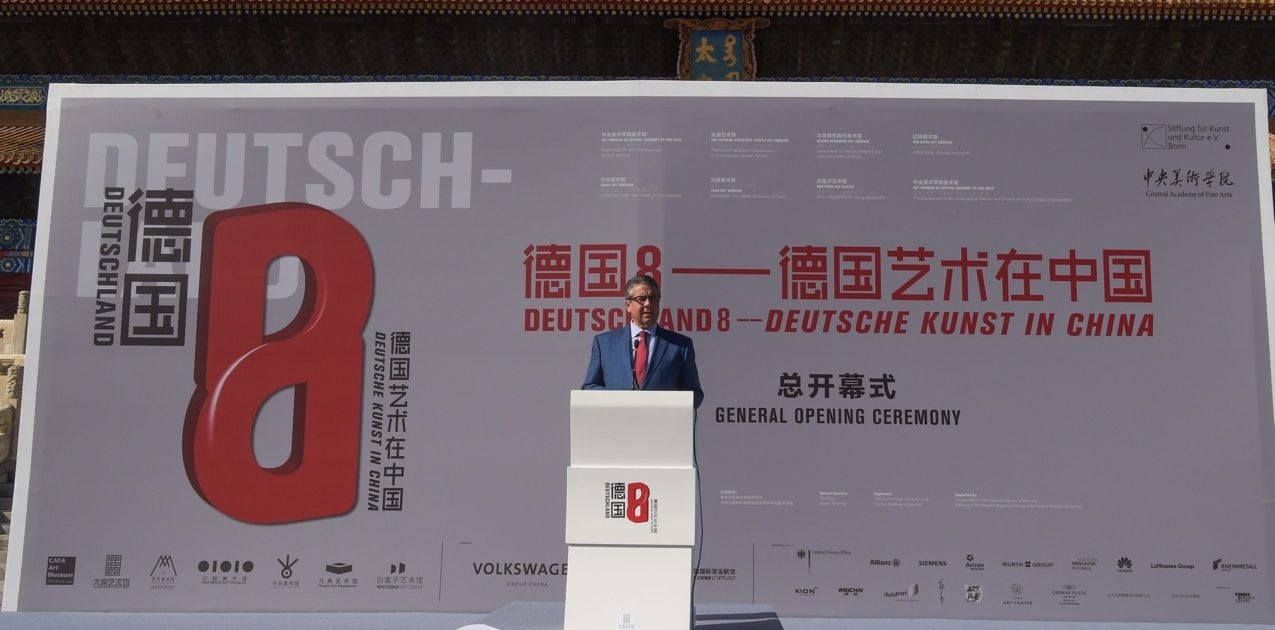
A group of artists participating in a massive exhibition of German art in Beijing titled “Deutschland 8” have sent a letter to the project’s organizers to protest one of the show’s sponsors, a German arms manufacturing company. The artists say that they were unaware of the sponsor’s involvement until seeing the logos on the official invitation just days before the show’s opening earlier this week.
In an email to artnet News, members of the group explained that they sent the letter to the exhibition’s curator, Walter Smerling, and the German organizer, the Bonn-based Stiftung für Kunst und Kultur e.V. (Foundation for Art and Culture), over the weekend to protest what they call “the instrumentalization” of their art to advance the arms manufacturer’s corporate image. (The show is co-organized with the Central Academy of Fine Arts in Beijing.)
Having received no reply from the organizers, two of the signatories, artists Hito Steyerl and Clemens von Wedemeyer, shared the letter on social media, drawing public attention to their protest.
Of the exhibition’s 55 participating artists, only a handful have signed the letter. In addition to Steyerl and von Wedemeyer, signatories include Rosemarie Trockel, Julian Rosefeldt, Marcel Odenbach, and the organization managing the estate of Harun Farocki and Antje Ehmann.
The controversial sponsor is the company Rheinmetall AG, a Düsseldorf-based manufacturer of tanks and military technology. According to recent articles in the German press, Rheinmetall is also involved in a controversial tank-building deal with Turkey, where, the artists note, “human rights are violated within a permanent state of exception.” (In light of the heightened tensions between Turkey and Germany, the German state’s cultural foundation Bundeskulturstiftung is boycotting the 15th Istanbul Biennial, which opened this past weekend.)
“Deutschland 8: German Art in China” opened in Beijing on Sunday with an official ceremony at the Tai Miao Temple that included a speech by German foreign minister and vice chancellor Sigmar Gabriel. The exhibition, which commemorates 45 years of diplomatic relations between Germany and China, presents 320 works of German art from the 1950s to the present at eight different locations across Beijing. It marks the first time international contemporary art has ever been shown in the Forbidden City.
Read the artists’ letter in full below.
As artists participating in the exhibition Germany 8 in Beijing, China
we have been surprised to learn that weapons manufacturer Rheinmetall is a supporter of a show supposed to foster dialogue between both countries.Even though Rheinmetall´s defence arm is not represented in China the corporation counts among Germany´s largest defence contractors, supplying vast amounts of ammunition and weaponry to war and crisis zones. Rheinmetall bombs and shells were deployed in actual war zones like Yemen. The company circumvents export restrictions through joint ventures and subsidiaries f.e. by building an ammunitions factory in Saudi Arabia.
Rheinmetall know-how will be used to build and retrofit tanks in Turkey, which is effectively engaged in civil war and where human rights are violated within a permanent state of exception.
As artists, we refuse to enhance the image of such corporations. We don’t support advertisement for weapons manufacturers under the umbrella of German cultural diplomacy and we explicitely protest the instrumentalisation of our work for this purpose.
for Harun Farocki: Antje Ehmann/ Harun Farocki GbR und Harun Farocki Institut/Marcel Odenbach/Julian Rosefeldt/Hito Steyerl/Rosemarie Trockel/Clemens v. Wedemeyer
The Foundation for Art and Culture in Bonn replied to the artists’ letter in a statement sent to artnet News, stating that “[t]he organizers take the concerns of these artists and their moral objections very seriously. For the critique of the artists touches upon fundamental questions pertaining to the cultural sector and to the relationship between politics, industry and public-private partnerships in the Federal Republic of Germany.”
The foundation’s executive board will thus address the controversial sponsorship openly in a public debate, which is first announced here:
Against this background, and in agreement with the Foundation’s Advisory Board, the Executive Board of the Foundation for Art and Culture has decided to address this important issue in a special public debate with representatives from civic society, politics and industry, and of course, with the artists, who will be invited to attend. This discussion event is scheduled to be held during the duration of exhibition.
The date and location of the open debate will be released shortly.